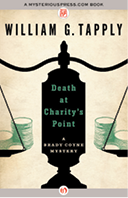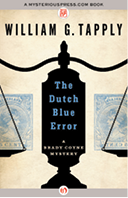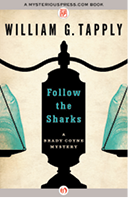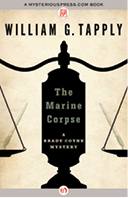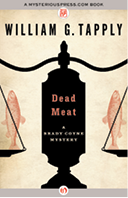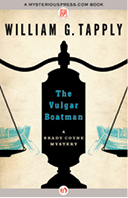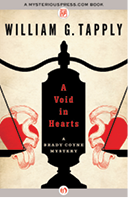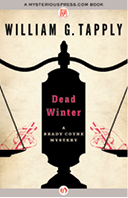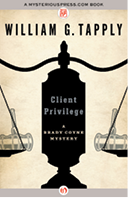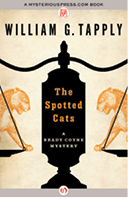Muscle Memory (31 page)
Authors: William G. Tapply

Nicholas, who was whatever the Italian equivalent of maître d’ would be called, greeted us inside the door with a quick bow. “Mr. Coyne,” he said, “and Miss Banyon. We are honored. Please, this way.”
He led us to a table for two by the front window, the only unoccupied seats in the place that I noticed. He pulled out Evie’s chair and held it for her. She smiled up at him over her shoulder as she sat. Nickie was dark and smooth and young and ridiculously handsome in his white shirt and puffy sleeves and gold chain and tight-fitting black pants. A young James Caan, with black curls on his forehead and perfect white teeth and a dimpled chin.
Vincent Russo once told me that Nickie was his favorite nephew, his sister Estelle’s youngest, a sweet, biddable boy, but not bright enough for the Business, by which he meant his various illegal enterprises, loan sharking among them. So Russo was setting Nickie up at Nola’s, and as soon as the boy learned how to keep the restaurant profitable—and how to cooperate with the various Russo relatives and associates who might need to move money through it and preempt it occasionally for discreet meetings—Uncle Vin would turn ownership over to him.
Meanwhile, Vincent Russo occupied the office in back. He claimed to be retired from the Business. Maybe so. But I happened to know that the FBI had not removed the surveillance camera that they’d been running from a rented room across the street for the past six years, and they still had a tap on the restaurant telephones, even though they knew that these days everybody did Business on cell phones.
Of course, Russo had known about the cameras and phone taps from Day One. He would’ve been insulted if they ever removed them.
Maybe the old man himself was pulling back from the Business, but he was still consorting with Businessmen.
Nickie told us that our waitperson would be Diane. He gave us menus and a wine list, bowed, smiled at Evie, and oozed away.
Evie leaned across the table. “He’s astonishingly pretty, isn’t he?” she whispered.
“Gorgeous,” I said. “Should I be jealous?”
“Oh, absolutely.”
Diane, our waitress, brought us a bottle of expensive Chianti compliments of Mr. Russo. She was quite astonishing herself, in a big-brown-eyed, dimpled-cheeks, short-black-haired, busty sort of way. She wore a low-cut peasant blouse and a narrow midthigh black skirt, and she had not the slightest suggestion of an Italian accent. She told us she’d grown up in Peterborough, New Hampshire, spent two years at Brewster Academy in Wolfeboro, and was now a junior at Boston College majoring in math.
Diane uncorked the wine bottle, set the cork on the table by my elbow, and splashed a little Chianti into my glass. I sniffed the cork, stuck my nose into the glass, sniffed and swirled, took a sip, chewed it, and smiled up at her. “Exquisite,” I said. “It begins with a wisecrack and finishes with a grin.”
Across from me, Evie rolled her eyes at my pantomime. She knew that I didn’t know squat about wine.
After Diane had poured the wine and left to fetch our antipasti, Evie said, “Okay. It’s a draw. Nickie and Diane. They’re terribly beautiful, both of them, aren’t they?”
“Mere children,” I said. “In the category of beauty, they are not to be mentioned in the same sentence as Evelyn Banyon.”
Evie couldn’t hold back her smile. “You’ll be rewarded for that, I promise,” she said. “Wait’ll we get home.”
“I’m just calling ’em as I see ’em, babe.”
She rolled her eyes. “You gotta be blind.”
I reached across the table and touched her hand. “Thanks for coming with me.”
“It’s nice,” she said. “It’s just…” She tilted her head toward the back of the restaurant, indicating Vincent Russo’s office.
“We’ll go to Hamersley’s next week,” I said, “just you and me, no agenda except wine and food and seduction.”
She smiled and squeezed my hand. “The seduction part is working already.”
I squeezed back. “Are you feeling better today?”
“Sure,” she said. “I’m fine. Tired, that’s all. Lots of stress at work. It fills my head, keeps me awake.”
“That’s all?”
“There should be more?”
“Have some more wine.”
An hour later we were sipping our
cappuccinos
and nibbling from plates of melons and grapes and cheeses when Nickie came over and put two snifters on the table. “Frangelico,” he said with a little bow. “Compliments of Mr. Russo.”
“I’d like to thank Mr. Russo in person,” I said.
“I’ll let him know,” said Nickie.
Five minutes later Nickie returned, this time pushing Vincent Russo in a wheelchair. Russo looked shrunken, as if his suit and shirt were several sizes too big for him. His skin was the pasty white of a man who spent his days and nights under fluorescent lighting.
Nickie parked him at our table. “Want something, Uncle Vin?”
Russo twisted his neck and looked back at Nickie. “Chianti,” he rasped in a voice that sounded like slabs of concrete grinding against each other. Then he turned and blinked at Evie as if he were surprised to see her sitting there. “Miss Banyon,” he said. “You are sunshine in the gloom of my poor establishment. Thank you for coming.”
Evie gave him her best smile. Evie’s best smile is utterly dazzling, and only I would notice the effort behind this one. “The food was wonderful,” she said. “Thank you for the liqueur. It’s so nice to see you again.”
He turned to me, lifted his left hand off the arm of his wheelchair, and held it out to me. I noticed that his right hand lay motionless in his lap. It was twisted into a claw. “Mr. Coyne,” said Russo. “You honor us. You and your beautiful lady.”
I gripped his hand awkwardly in both of mine. It felt like a pigskin glove full of matchsticks. “How are you doing, Mr. Russo?” I said. “I heard…”
He took his hand back and wobbled it in the air. “Getting old is a sonofabitch, excuse me, Miss Banyon. If it ain’t one thing it’s something else, huh?” He tapped his head, still using his left hand. “Nothin’ wrong up here. They tell me that’s what counts. And you, Mr. Coyne? You are well?”
I shrugged. “My health is fine.”
Russo looked at me from the depths of his black, hooded eyes. “I hear a
but
in your voice. Your business? Your family? I hope your family is well. Your two boys.”
“My boys are excellent,” I said, cringing at the idea that Vincent Russo even knew I had two sons, “and business is okay. I’m a little concerned about a friend of mine. It preoccupies me. I’m sorry that it shows.” I waved it away with the back of my hand. “I don’t want to bother you with my insignificant worries.”
“Perhaps I know your friend?”
“Come to think of it,” I said, “perhaps you do. Like you, he’s in the restaurant business. His name is Dalton Lancaster. He manages the Boston Scrod.”
“The Boston Scrod, eh?” Russo blinked, then shook his head. “No, I guess not. Your friend Lancaster, he has troubles, huh?”
“Three men jumped him in a parking lot last night,” I said. “They kicked him in the face.”
“They robbed him?”
“No,” I said. “It was apparently a warning.”
“A warning,” said Russo.
“They didn’t quite say it,” I said, “but it probably had something to do with a debt.”
“And he was badly hurt?”
I shook my head. “Not this time.”
Russo shook his head. “Uncivilized,” he said, “kicking a man in the face. But on the other hand, failing to pay a debt is also dishonorable. What a world, huh?”
“The thing is,” I said, “my friend Lancaster swears he doesn’t owe anybody any money.” I waved my hand. “Well, it’s no concern of yours. It weighs on my heart, that’s all. I’m worried for my friend. He cannot pay off a debt he doesn’t owe, and then what will happen to him?”
“I see your point,” said Russo. “Please convey my best wishes to your friend, as one restaurant man to another. It’s a hard business. You might suggest to him that it would be wise to take taxis, avoid parking lots for a while, eh?” He tried to smile, but only half of his face participated.
“Yes,” I said, “I told him exactly the same thing. Coming from both his lawyer and a fellow restaurateur, perhaps the advice will make sense to him.”
Russo chuckled. He reached over and gripped my arm with his left hand. Then he tilted his head toward Evie. “Come back soon, Miss Banyon. We will always have a table by the window for you.”
She smiled. “Thank you, Mr. Russo.”
He lifted his hand, then let it fall back on the arm of his wheelchair. “Mr. Coyne. Don’t be a stranger, huh?”
I nodded. “I won’t.”
Russo half turned his head, and Nickie was there at his wheelchair in an instant. He smiled at us with those ridiculously white teeth, then pushed his uncle toward the rear of the restaurant.
When I looked at Evie, she was frowning at me. “Dalton Lancaster got mugged? That’s what last night was all about?”
“Not mugged, exactly,” I said. “They didn’t take anything. It was a warning.”
“They think he owes money and he doesn’t?”
“So it seems.”
“Does that make any sense?”
“Not much,” I said.
“So,” said Evie, “that’s what this—this charade was all about. You and Russo not quite saying what you mean, all this polite concern for each other. You assume it’s his thugs who beat up your client. You’re asking him to lay off Dalton Lancaster.”
“Not exactly,” I said. “Russo doesn’t do favors like that for people like me. Not favors that involve a debt. Debts are supposed to be matters of honor for both parties. If Dalt really is into him, there’s nothing I can do about it. I was just asking Russo to be sure he had the right man before he decided to fracture his skull or rupture his spleen or shoot him in the ear.”
“Jesus,” she muttered. “Let’s get the hell out of here.”
Buy
One-Way Ticket
now!
M
Y THANKS TO KEN
Quat, Dr. Jonathan Kolb, Dr. Randall Paulsen, Dr. Barbara Schildkrout, and Paul Keating, who generously contributed their professional expertise to various elements of this story; to Rick Boyer, who has been with me and Brady from the beginning; to Keith Kahla, whose insights and high editorial standards not only demanded my best but also showed me how; and to Vicki Stiefel, whose editorial readings of drafts of this book have been, I know, a labor of love.
All rights reserved, including without limitation the right to reproduce this ebook or any portion thereof in any form or by any means, whether electronic or mechanical, now known or hereinafter invented, without the express written permission of the publisher.
This is a work of fiction. Names, characters, places, and incidents either are the product of the author’s imagination or are used fictitiously. Any resemblance to actual persons, living or dead, businesses, companies, events, or locales is entirely coincidental.
Copyright © 1999 by William G. Tapply
Cover design by Kathleen Lynch
978-1-4804-3629-9
This 2013 edition distributed by MysteriousPress.com/Open Road Integrated Media
345 Hudson Street
New York, NY 10014


